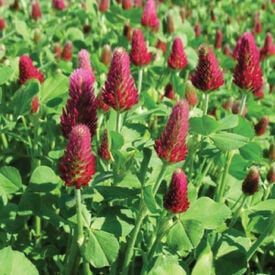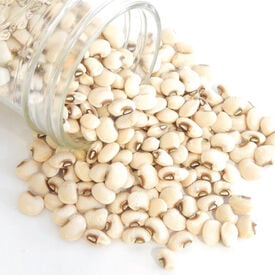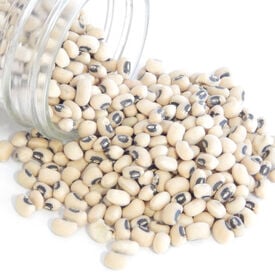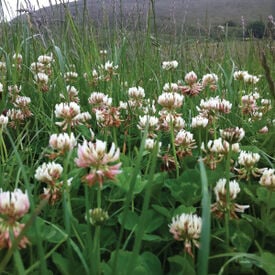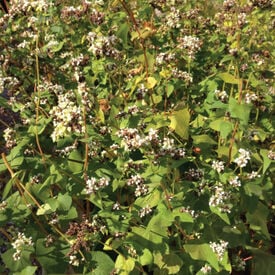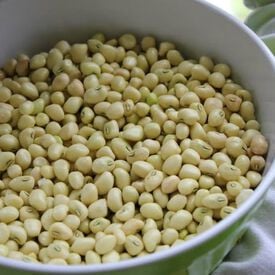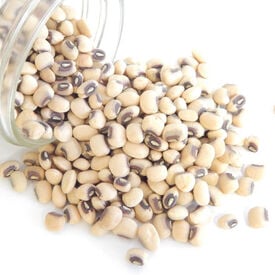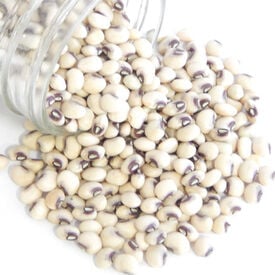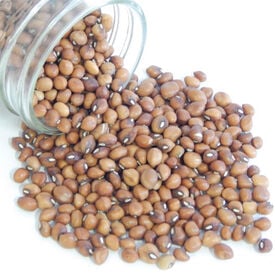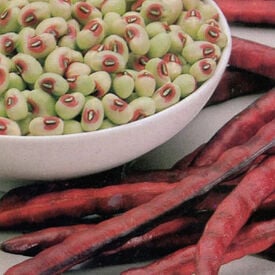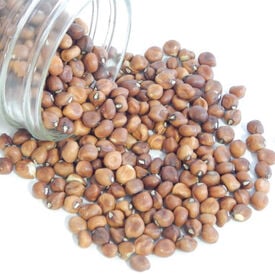Dixie Lee cowpea seeds are a popular variety of cowpeas known for their high yield, disease resistance, and adaptability to various climates. These seeds produce vigorous, heat-tolerant plants that thrive in warm, dry conditions, making them ideal for Southern and drought-prone regions. The Dixie Lee variety is particularly favored for its tender, flavorful beans that are often used in a range of culinary dishes, from soups to side dishes. The plants typically produce medium-sized, cream-colored pods with dark brown or black-eyed beans, and they can be harvested both as fresh beans or dry beans. As a legume, Dixie Lee cowpeas also enrich the soil by fixing nitrogen, benefiting crop rotation systems.
The Crimson Clover is an attractive winter annual that can be planted fall or early spring and will protect and improve the soil. This good nitrogen fixer (70-150 lbs per acre per year) blooms showy crimson flowers in late spring that are an excellent source of nectar for bees. This variety inter-seeds well with grass, making it a great way to ready your vegetable garden for the spring or beautify a landscape! Not to be confused with the tough perennial clovers that can take over a meadow. Uses: Bees & Beneficial Insects, Chicken Forage, Compaction Control, Deer Attractant, Erosion Control, Forage, Green Manure, Nitrogen Fixation, No Till, Weed Suppression
The Big Boy Purplehull is a high yielding, popular Southern cowpea that is great for home gardens. Big Boy Purplehull is a long podded variety with 13-16 peas per pod that are light tan in color and oblong shape. This is a good garden variety and is very prolific. If you are using for Nitrogen fixation we highly recommend using a cowpea inoculant. Try with cowpea inoculant for maximum Nitrogen fixation.
California Blackeye #5 is a high yielding, vigorous and easy to grow. You can use these as green shell peas or dry like winter beans. Pods reach 6-8" long and are loaded with creamy, delicious seeds. Does well in high heat areas. Treated Seed.
The White Dutch Clover is a perennial clover variety that is a customer favorite for controlling erosion while protecting the soil! This legume is a living mulch of permanent cover that spreads by stolons. Grow low so takes close mowing and grazing. The White Dutch Clover benefits bees and insects as well as fixes nitrogen. Uses: Bees & Beneficial Insects, Chicken Forage, Deer Attractant, Erosion Control, Forage, Green Manure, Nitrogen Fixation, No Till, Weed Suppression
The Common Buckwheat is a grain that can be planted late spring to early summer and improves top soil and an effective choke weed! This variety establishes quickly and matures in 60 days. This buckwheat accumulates phosphorus and and potassium for following crops and is frost sensitive. Buckwheat (Fagopyrum esculentum Moench): Cool Season, Grain, Annual, Upright growth habit, Enhances soil P availability,Crude protein: straw 5%, grain 13% Uses: Bees & Beneficial Insects, Green Manure, No Till, Organic Matter (Biomass), Weed Suppresion
The Zipper Cream cowpeas are very easy to grow and are a tasty Southern favorite! This variety produces bushy 2-3' plants that bear heavy yields. The 6-9" large pods have large, creamy-white seeds. There are 18-20 seeds per pod. The Zipper Cream is an easy to shell cowpea. Treated Seed.
The Quickpick Pinkeye cowpea is a bush type southern cowpea with early maturity and good disease resistance. This variety is a pinkeye Purplehull type variety that is determinate, erect, compact (reach about 20 inches), and non-vining. This cowpea gets its name, Quickpick, because it matures in about 60 days. The pods are dark-purple and about seven to eight inches long containing nine to eleven, kidney-shaped seeds with large, maroon colored eyes. If you are using for Nitrogen fixation we highly recommend using a cowpea inoculant. Try with cowpea inoculant for maximum Nitrogen fixation.
Pinkeye Purple Hull cowpea is one of the most popular varieties preferred by Southerners. Cowpeas in general are great for drying and canning. This variety's hulls are purple and its cowpeas are green with pinkeyes when freshly picked turning cream with dark maroon when dried. The Pinkeye Purple Hull produces pods that are six to seven inches long and purple. If you are using for Nitrogen fixation we highly recommend using a cowpea inoculant.
The Mississippi Silver cowpea is adapted to hot humid climates, but does well in most climates. This variety produces pods 6-7 " long, and that are colored silver, occasionally streaked with rose. The Mississippi Silver is easy to grow and shell. If you are using for Nitrogen fixation we highly recommend using a cowpea inoculant. Try with cowpea inoculant for maximum Nitrogen fixation.
The Knuckle Purple Hull is a bush type cowpea producing heavy yields of purple pods. Cowpeas in general are great for drying and canning. This variety tends to stay off the ground and cluster making for easy picking. This cowpea is referred to as a "Knuckle Hull" because of the big, plump cowpeas. Try with cowpea inoculant for maximum Nitrogen fixation.
The Dimpled Brown Crowder is an excellent cowpea for canning, freezing or drying. The Dimpled Brown Crowder Cowpea is a prolific yielder with pods that contain 12-15 peas that are closely bunched together. If you are using this variety for Nitrogen fixation, we highly recommend using a cowpea inoculant. Try with cowpea inoculant for maximum Nitrogen fixation.

